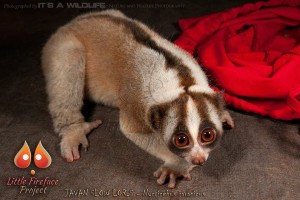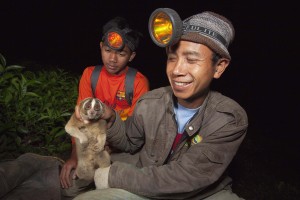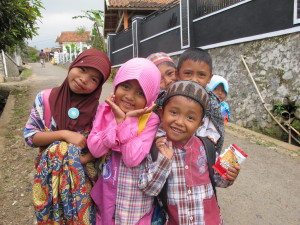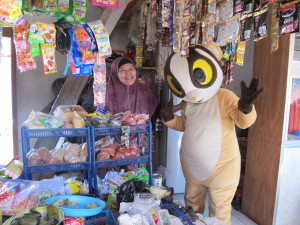![]() My name is Aconk and I have been working with Little Fireface Project (LFP) for 2 ½ years. Even though I am the youngest working here, I was the first to start working with this new project. My father, Pak Ade Jaja taught me how to walk in the forest and taught me how to identify animals and plants, including plants for medical purposes. There were many myths about the slow loris, but I was not scared of them. I had never seen one in the forest before I started with LFP.
My name is Aconk and I have been working with Little Fireface Project (LFP) for 2 ½ years. Even though I am the youngest working here, I was the first to start working with this new project. My father, Pak Ade Jaja taught me how to walk in the forest and taught me how to identify animals and plants, including plants for medical purposes. There were many myths about the slow loris, but I was not scared of them. I had never seen one in the forest before I started with LFP.
 The local myths about the slow loris probably helped save the loris from the pet trade here in our village. We believe that if the blood of a slow loris touches the ground all of the ground will dry up and the crops will die. So, we never touched the loris. We also believe that if a slow loris is in your house, your family will have bad luck or someone could even die! I don’t believe these stories, but many people do. City people don’t believe these myths, so this is bad for the slow loris.
The local myths about the slow loris probably helped save the loris from the pet trade here in our village. We believe that if the blood of a slow loris touches the ground all of the ground will dry up and the crops will die. So, we never touched the loris. We also believe that if a slow loris is in your house, your family will have bad luck or someone could even die! I don’t believe these stories, but many people do. City people don’t believe these myths, so this is bad for the slow loris.
Little Fireface Project is like a miracle to me and our village. It has really changed the mind of people about caring for the forest, all animals and the environment. LFP volunteers and staff (including us trackers) show local people how to maintain balance in the eco-system.  We have learned and taught that the ecosystem is important and that we should keep our environment healthy for our children and grand-children. We don’t want them to only hear stories of what was here. We share our experience and ideas with our community by holding movie days, pride day weekend events, nature club lessons for children and other impromptu events. Not only is LFP helping protect the loris, it is also providing jobs and income for our small and remote village. Children and adults are also learning English, which would be impossible for many of us, as we are so far from the nearest city. We are also protecting other animals in the forest, not onlt the loris. During our rounds, which we do seven days a week, we see many civets, owls, frogs and leopard cats. Our community respect them and are especially proud of the Javan slow loris.
We have learned and taught that the ecosystem is important and that we should keep our environment healthy for our children and grand-children. We don’t want them to only hear stories of what was here. We share our experience and ideas with our community by holding movie days, pride day weekend events, nature club lessons for children and other impromptu events. Not only is LFP helping protect the loris, it is also providing jobs and income for our small and remote village. Children and adults are also learning English, which would be impossible for many of us, as we are so far from the nearest city. We are also protecting other animals in the forest, not onlt the loris. During our rounds, which we do seven days a week, we see many civets, owls, frogs and leopard cats. Our community respect them and are especially proud of the Javan slow loris.
I work with three other trackers and they have similar positive things to say about LFP too. Pak Adin and Yiyi are two of our trackers who also work their farms here in West Java. From a farmer’s perspective, they have learned that slow lorises and other mammals, birds and reptiles help keep pests at lower numbers. Slow lorises are wonderful at eating insects and are really helpful, as many farms do not use insecticides.
Pak Adin has children that regularly attend our Nature Club classes. They learn English and about the environment and that is REALLY important, as the children don’t really learn that at school. LFP allows the children to try crafts and games that our small village has never seen or even heard of.
 Even the children, who are too young to attend Nature Club or school like to play games with the volunteers and staff at LFP. It’s always nice to hear that the children are involved in fun games. Their favourite thing to do is colour in. Nazmi, Yiyi’s son loves visiting the field station coordinator and sit and do colouring with her.
Even the children, who are too young to attend Nature Club or school like to play games with the volunteers and staff at LFP. It’s always nice to hear that the children are involved in fun games. Their favourite thing to do is colour in. Nazmi, Yiyi’s son loves visiting the field station coordinator and sit and do colouring with her.
 The local shop owners also had very positive things to say about LFP. They really enjoy seeing the ‘bule’ (local name for white people), as they always stop for a chat, even if they can’t speak Indonesian. LFP support the local shops and the volunteers like to eat Indonesian cakes!
The local shop owners also had very positive things to say about LFP. They really enjoy seeing the ‘bule’ (local name for white people), as they always stop for a chat, even if they can’t speak Indonesian. LFP support the local shops and the volunteers like to eat Indonesian cakes!
Before I started with LFP I could only speak Sunda (Javan language) and Bahasa Indonesian. I am now advanced in speaking in English and Yiyi and Pak Adin are slowly learning. We feel very proud to work with Little Fireface Project.
I guess we are lucky that laughter is an international language, and that we all get along really well.
Aconk, Adin and Yiyi – LFP Trackers
